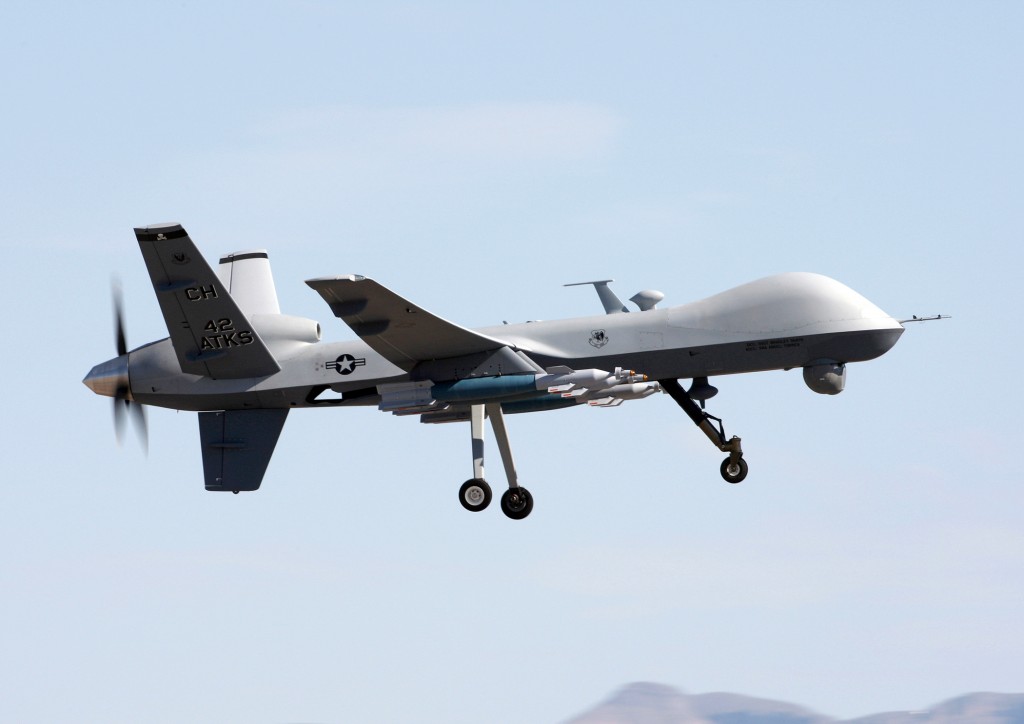Parliament’s influential human rights committee has told the government to get its act together in justifying lethal drone strikes during peace-time.
The Joint Committee on Human Rights has criticised the Government’s policy on the use of drones for targeted killing in a new report.
One of the Joint Committee’s roles is to conduct inquiries on issues of human rights relevance. This inquiry followed UK military action taken against Reyaad Khan in Syria on 21 August 2015 resulting in his death. Reyaad Khan featured in a prominent Islamic State propaganda video in 2014 and David Cameron has said that Khan was planning “specific and barbaric attacks against the West”.
The problem of drone strikes during peace-time
Although the Committee accepted that the action taken against Reyaad Khan was during armed conflict, as part of the same armed conflict in which the UK was already involved in Syria, it also found that it was Government policy to use lethal force (that is, force that could result in death) outside of armed conflict. This was found to be when there was no other way of preventing an imminent terrorist attack against the UK.
The Committee urged the Government to clarify its views on the legal basis of this policy. It also asked the Government to clarify the basis on which it contributes to the use of lethal force abroad outside armed conflict by other countries such as the US. Finally, it recommended that the UK lead the way globally in developing international consensus on the use of lethal force abroad in counterterrorism operations outside armed conflict. To do this, the UK should work in partnership with international human rights bodies such as the UN Human Rights Council and the Council of Europe.
One of the principal issues of the report seems to be the blurring of the Law of War and the law on international counter-terrorism operations.
Is this a human rights issue?

Yes. The Committee took issue with the fact that the UK Government might be using lethal force against people outside of an armed conflict scenario. This would mean the scenario is no longer governed by the Law of War, and would bring it within the remit of the European Convention of Human Rights (the ECHR). Article 2 of the ECHR governs the right to life, and is incorporated into UK law by the Human Rights Act 1998.
On the current state of the law, the ECHR applies abroad “whenever and wherever a state which is a contracting party to the [ECHR] purports to exercise legal authority or uses physical force”. It has been accepted that the use of lethal force (that is, killing someone) is the clearest example of exercising physical control and power over a person. Therefore, the ECHR will apply when the Law of War does not and when the UK is engaging in acts (such as the lethal use of drone strikes) that result in the death of a person.
Article 2 of the ECHR prohibits the taking of life by the use of force where this is not justified by any of the exceptions expressly permitted by its text. One of the exceptions is where the deprivation of life results from the use of force which is “no more than is absolutely necessary in defence of any person from unlawful violence”.
Article 2 requires that:
- the use of lethal force must be “no more than absolutely necessary” to avert an immediate threat of unlawful violence to other people and be strictly proportionate to that aim;
- the use of lethal force by the state must be effectively regulated by a clear legal framework and the planning and control of any particular operation must be such as to minimise the risk of loss of life; and
- there must be an effective independent investigation capable of leading to accountability for any unlawful deprivation of life.
The Committee urged the government to acknowledge that where it takes a life when it is not in armed conflict, the higher standards laid down in the Human Rights Act and the ECHR have to be met. It is only where someone is killed in an armed conflict, that the lower standards of the Law of War applies.
For more on the right to life, take a look at our explainer here. To find out how human rights protect soldiers, read our opinion post here.







